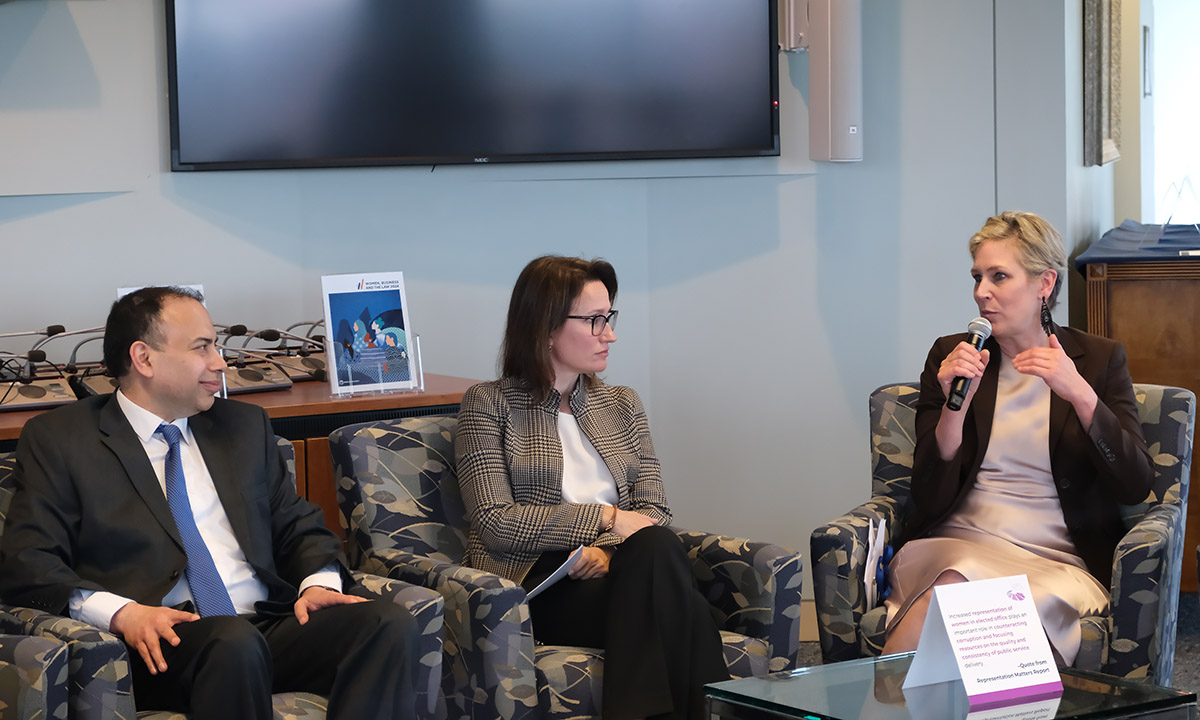Imagine a policy that, by itself, could double the world’s growth rate over a decade, raising countless millions out of poverty and extending opportunity around the globe. You'd go for it, wouldn’t you?
The policy is gender equality. And while many governments have committed in principle to that goal, the fact is that progress has stalled in many parts of the world where it truly matters – the day-to-day lives of real people. A new report from the World Bank’s Women, Business and the Law project finds that women on average have less than two thirds of the legal protections that men have, down from a previous estimate of just over three quarters.
In an effort to close that gender gap, the Oliver Wyman Forum is launching Representation Matters, a collaborative initiative with Women, Business and the Law and Women Political Leaders (WPL). This project is dedicated to conducting research into the crucial intersection of female representation in politics and its impact on legal and economic equality between women and men. It builds on the findings of a pilot analysis by WPL and the Forum last year, which revealed that nations with higher levels of female representation in senior governmental positions have more laws promoting equality and greater participation of women in the workforce.
Why this is so important now
Our initiative comes at a critical time. Achieving equal opportunity is not only a basic human right for half of the world’s population; it is also a force for change that can promote much-needed economic growth and cultivate widespread prosperity across all levels of society.
In many parts of the world, women’s limited political influence perpetuates a vicious circle of limited legal rights and economic power. The latest Women, Business and the Law report added two new indicators that are crucial for women’s economic opportunities – safety from violence and access to childcare – and most countries score poorly on them. While 151 economies have laws prohibiting sexual harassment in the workplace, only 39 prohibit it in public spaces such as mass transit, which can impede women’s ability to get to a job and fully participate in the workforce. And fewer than 80 of the 190 economies measured provide some kind of support or tax breaks for parents with young children, which leaves women largely responsible for childcare.
Defining the economic opportunity
In addition, many gender laws lack the measures necessary for proper implementation. For example, while 98 economies mandate equal remuneration for work of equal value, only 35 have pay-transparency or enforcement measures that can make equal pay for women a reality.
Representation Matters seeks to turn that vicious circle into a virtuous one in which women participate at a higher rate in the political process, gain greater representation – particularly at ministerial and leadership levels – and promote policies that empower women, says Norman Loayza, an economist and director of the World Bank’s global indicators group.
The dividends of cultivating such a virtuous circle can be substantial. Hana Brixi, the World Bank’s Global Director for Gender, notes that several World Bank programs have shown that empowering women through information and cash transfers improves children’s health and educational outcomes, and makes economies more resilient.
The World Bank estimates that eliminating discrimination against women could double the world’s growth rate and increase global GDP by 20% over the next decade. The International Monetary Fund (IMF), which began systematically integrating gender into its work two years ago, estimates that closing the female labor force participation gap alone in emerging markets and developing economies could boost incomes in those countries by 23%.
“It’s macro critical,” says Rishi Goyal, Deputy Director and Senior Adviser on Gender at the International Monetary Fund (IMF). “It’s good not just for women but for society.”
What has to change
Getting such a positive dynamic going will require changes both in culture and in political institutions. Silvana Koch-Mehrin, President and Founder of Women Political Leaders, notes that men remain largely overrepresented in political leadership. Many parliaments still do not mandate paid maternity leave, or paternity leave for that matter. And even the very plumbing of many governing chambers falls far short of being gender balanced. As she puts it, “Politics is a place created by men for men. It is stuck in the 19th century.”
Indeed, a hostile environment is driving many women out of politics, with one in six leaving during or just after their first term of office, Koch-Mehrin notes. According to WPL’s international study of women parliamentarians, more than 85% experienced psychological violence such as sexist remarks or images, and many received threats of death, rape, or abduction.
What politics can learn from business
Political institutions could learn some lessons from the private sector. Companies aren’t perfect but most leading ones are asking themselves if they have the right policies and environment to attract and retain the talent – both female and male – they need and tracking their performance on hiring.
Role models also can play a big part in attracting more women into leadership roles. Rania Al-Mashat, Egypt’s Minister of International Cooperation, underscores the importance of opening doors for other women to enter, noting that she previously served as her country’s first female minister of tourism and the youngest member of the cabinet. The IMF’s Goyal points out that Christine Lagarde became the Fund’s first female managing director 13 years ago, and today three of the organization’s top five leaders are women, including the current MD, Kristalina Georgieva.
We look forward to working with our partners and the wider community to actively explore ways of extending opportunities and collectively building a more prosperous society. Together, we can create lasting impact and drive positive change for all.

